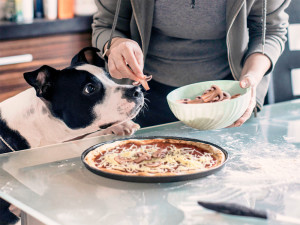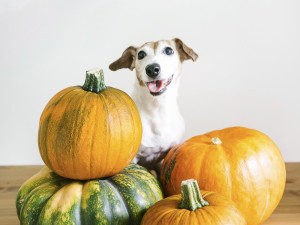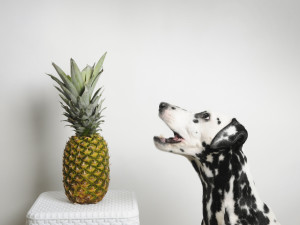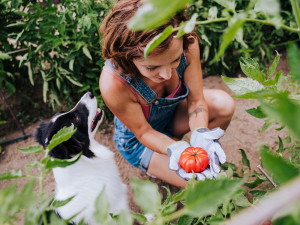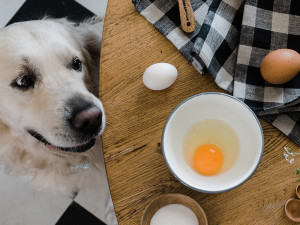Can Dogs Eat Pepperoni? Experts Answer
Keep an eye on them on pizza night.

Share Article
In This Article:
Is Pepperoni Safe for Dogs? Why Shouldn't Dogs Eat Pepperoni? Risks of Giving Your Dog Pepperoni What to Do If Your Dog Has Eaten Pepperoni How Much Pepperoni Is Too Much? What to Feed Your Dog Other Than Pepperoni Bottom Line: Don’t Feed Your Dog Pepperoni Frequently Asked Questions
Many people wouldn’t have a pizza without pepperoni on it. Many of those same individuals have dogs, so it’s important to know if a pup can have a bite when begging for it. The simple answer is not to feed your dog pepperoni, but let’s take a closer look at why it’s unsafe for dogs.
Is pepperoni safe for dogs?
While a small nibble may not cause problems for your dog, pepperoni eaten regularly or in large amounts is unsafe. The ingredients in pepperoni are high in fat and include salt and seasonings, which can lead to serious health issues. This is not the food to choose when looking for a treat for your canine companion.

Why shouldn't dogs eat pepperoni?
As mentioned, pepperoni contains nutritional components that are not good for your dog’s GI tract and general health. Let’s look at each individually to see why it can increase your dog’s risk of certain chronic illnesses, even in small amounts and occasionally.
High fat content
Too much fat in a dog’s diet can cause three problems: gastrointestinal upset, obesity, and pancreatitis. Pepperoni is exceptionally high in fat, putting your dog at risk for any of these conditions.
Salt content
Too much salt can be dangerous for your pup. It can cause dehydration, increased blood pressure, and even sodium poisoning, a severe condition. Pepperoni is heavily salted to increase flavor and preserve shelf life. Excessive salt is not good for people, either, but dogs are much more sensitive to salt.
Spices and additives
There may be several seasonings in pepperoni, including garlic powder, paprika, fennel seeds, and other spices. Some of these are toxic to dogs. For example, garlic can damage a dog's red blood cells, leading to anemia. Nitrates and nitrites, used as preservatives, also harm dogs if eaten in large quantities.
Risks of giving your dog pepperoni
While minor disorders can occur in the short term from feeding your dog pepperoni, significant health issues can develop over time. Here are a few:
Obesity
We already have a dog obesity epidemic; feeding your dog pepperoni could add to it. Pepperoni is fatty and salty and puts your dog at risk of becoming overweight. Obesity can lead to several other dangerous conditions, such as diabetes, arthritis, and heart disease.
Heart disease
In addition to obesity, pepperoni's high salt and fat content can contribute to heart disease. Dogs with heart problems can have a shorter life and a decreased quality of life.
Pancreatitis
Even if you’ve never had a dog with pancreatitis, you’ve no doubt heard of it. Pancreatitis refers to inflammation of the pancreas, and it’s a serious, even life-threatening disease. Eating rich, fatty foods like pepperoni can lead to pancreatitis. The symptoms are pain, diarrhea, vomiting, and lethargy, which are often emergencies.
What to do if your dog has eaten pepperoni
If you notice that your dog got into the pepperoni and it was a very small portion, don’t be alarmed. Just watch them closely and be on the alert for the following symptoms:
Symptoms to watch for
Monitor your dog for any unusual behavior, including:
Vomiting or diarrhea
Increased thirst or increased urination
Lethargy
Decreased or loss of appetite
Signs of abdominal pain (crying, restlessness, lack of interest in moving)
If your dog ate too much pepperoni or has any of these signs, contact your veterinarian immediately.
How much pepperoni is too much for dogs?
Pepperoni, in any amount, should be avoided. However, a very small bite probably will not cause any problems in a healthy adult dog – but even small amounts can be risky for puppies, seniors, or dogs with underlying health issues. Several slices or frequent feeding can lead to health problems, even in the short term. The safest action is to avoid giving your dog any pepperoni at all.
What to feed your dog instead of pepperoni
If you want to find something you can feed your dog as a treat but doesn’t have health risks, try these:
Plain cooked meats without seasoning
Commercial dog treats made with natural, limited ingredients
These alternatives provide a tasty reward without risking your dog’s health.
Bottom line: Don’t feed your dog pepperoni
Those big yearning eyes may tempt you to share anything you’re eating with your dog, but it’s not worth the risk. There are many things that people eat that are toxic to dogs. Pepperoni is one of them. It’s not good for your pup primarily due to high fat, salt, harmful spices, and chemical additives. It can lead to pancreatitis, obesity, and heart disease. Obesity can lead to several other diseases.
Instead, feed your dog healthy natural fruits and vegetables such as carrots, apples, and cucumbers. Keeping harmful human foods away from your dog is one of the easiest and most effective ways to ensure your canine friend's long, healthy life.
FAQs
Is pepperoni a good snack for dogs?
No, pepperoni is not a good snack for dogs. The fat, salt, spices, and chemical additives put your dog at risk for pancreatitis, heart disease, and obesity, which can lead to other diseases.
Can dogs eat pizza with sausage and pepperoni?
No, dogs should not eat pizza with sausage and pepperoni. The salt, fat, spices, and chemical additives make it potentially harmful to your dog. The pizza itself also has too much fat and often garlic, which is harmful to dogs.
What happens if my dog eats pepperoni?
If your dog is an adult and healthy and the pepperoni eaten was only a small amount, there will probably not be any problems. Of course, watch your pup for unusual signs of illness like vomiting, diarrhea, and dehydration. If you see these signs, contact your veterinarian.
References:
Bland, I.M., et al. “Dog Obesity: Veterinary Practices’ and Owners’ Opinions on Cause and Management.” Preventive Veterinary Medicine, vol. 94, no. 3-4, May 2010, pp. 310–315 https://www.sciencedirect.com/science/article/abs/pii/S0167587710000309opens in new tab
Houpt, Katherine, et al. “Use of Taste Repellents and Emetics to Prevent Accidental Poisoning of Dogs.” American Journal of Veterinary Research, vol. 45, no. 8, 1 Aug. 1984, pp. 1501–1503, avmajournals.avma.org/view/journals/ajvr/45/8/ajvr.1984.45.08.1501.xmlopens in new tab
Pirie, H. M. “The Pathology of Heart Disease in the Dog.” Journal of Small Animal Practice, vol. 8, no. 3, Mar. 1967, pp. 175–183, https://onlinelibrary.wiley.com/doi/10.1111/j.1748-5827.1967.tb04540.xopens in new tab
Xenoulis, P. G. “Diagnosis of Pancreatitis in Dogs and Cats.” Journal of Small Animal Practice, vol. 56, no. 1, Jan. 2015, pp. 13–26, onlinelibrary.wiley.com/doi/full/10.1111/jsap.12274opens in new tab

Dr. Shelby Neely, DVM
Dr. Shelby Neely is a freelance writer and veterinarian who graduated from the University of Pennsylvania School of Veterinary Medicine and has practiced veterinary medicine for 30 years, specializing in small animals. Her work has appeared in Allivet, AsktheCatDoctor, WhiskerDocs, Ask the Cat Doctor Radio, Ask the Cat Doctor TV, and numerous other websites, brochures, newsletters, newspapers, and ebooks. In her spare time, Dr. Neely likes to spend time with her three children, two grandchildren, three cats, two grand-cats, and five grand-dogs.
Related articles
Can Dogs Eat Pumpkin?
This superfood is delicious and full of nutrients—but how much is too much of a good thing?
Can Dogs Eat Pineapple?
Pineapple is a healthy, sweet treat for dogs—as long as you feed it to your pup in moderation.
![A woman smiling at her dog while carrying a bowl of food.]()
Can Dogs Eat Yogurt?
Yes, yogurt is a safe and healthy treat for dogs.
Can Dogs Eat Tomatoes?
Bite-size pieces of ripe, red tomatoes are safe—but you should skip the marinara sauce.
![Golden retriever looks at some eggs on the counter]()
Can Dogs Eat Eggs?
Yes, eggs are a nutritious treat for dogs.
Can Dogs Eat Peas?
And why it shouldn’t be the main ingredient in their food.

